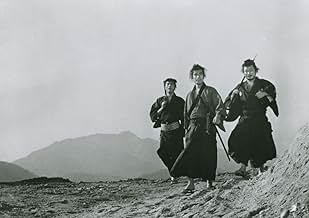De pauvres paysans kidnappent la fille du shogun dans l'espoir d'obtenir une baisse d'impôts. Sensible à leur sort, un ronin errant décide de les aider.De pauvres paysans kidnappent la fille du shogun dans l'espoir d'obtenir une baisse d'impôts. Sensible à leur sort, un ronin errant décide de les aider.De pauvres paysans kidnappent la fille du shogun dans l'espoir d'obtenir une baisse d'impôts. Sensible à leur sort, un ronin errant décide de les aider.
- Réalisation
- Scénario
- Casting principal
Avis à la une
Of course, there are Gosha's typical studied camera angles and compositions (you see some interesting "moving camera" work, which significantly predates the attempts of "pioneering" US directors). However, "Sanbiki no samurai" also showcases Gosha's ability to tell a story through facial expressions, rather than simply relying upon dialogue.
This is all film-school wankery. The bottom line is that "Sanbiki" is a gripping chambara flick, with a solid morality tale disguised as a cynical amorality tale. (Note that a common theme through many Japanese "chambara" is that of cynical ex-samurai who ultimately decides to risk life and limb for some hopeless but noble "little guy" cause.)
This theme was repeatedly, um, emulated by the likes of Sergio Leone with his spaghetti westerns. However, my point is that such tales are just plain entertaining. The three actors playing the samurai also turn in great performances.
Viewers new to Hideo Gosha may wish to start with "Goyokin" or "Hitokiri" (a/k/a "Tenchu"), but if you've seen those two already (or if they're already checked out), then this is still a definite movie to catch!
Very similar to Seven Samurai in terms of style and themes, this is another take on the familiar story of cynical samurais helping out poor peasants in their fight against the oppression of the rich and powerful. Three lowly peasants kidnap a daimyo's daughter and demand a tax reform that will ease the economic burden for all the peasants in the nearby villages. It's all well plotted and interesting for the duration with great performances all around and near superb swordplay action. Gosha's two Samurai Wolf films as well as Sword of the Beast would make ideal companion pieces as an entry point to the director's output. Fans of Kurosawa's jidaigeki work are likely to appreciate it just as well.
The story is familiar. The Samurai feel sorry for the poor peasants and one even gives up his luxurious life in the Magistrate's service to fight the evil tax collector that is bleeding the peasants dry.
It's the film debut for Hideo Gosha, and he does a great job of mixing samurai fighting and humor and concern for the poor into an enjoyable film that was beautifully shot.
I am certainly going to look for more of his work.
Le saviez-vous
- AnecdotesHideo Gosha's directorial film debut.
- Citations
Sakon Shiba: [Threatening to kill the Magistrate; his daughter physically intervenes] For his victims' sake, I can't allow him to live.
Aya: Please!
Sakon Shiba: Move, or I'll kill you!
Aya: Kill me, then. No matter what he's done, I'm still his daughter.
Sakon Shiba: [the Magistrate breaks free and runs for it, but Shiba deftly cuts off his top knot with a quick thrust of his sword] Let the lord see you in disgrace. Let the peasants see you in disgrace.
- ConnexionsFeatured in Best in Action: 1964 (2020)
Meilleurs choix
- How long is Three Outlaw Samurai?Alimenté par Alexa
Détails
- Durée
- 1h 34min(94 min)
- Couleur
- Mixage
- Rapport de forme
- 2.35 : 1































